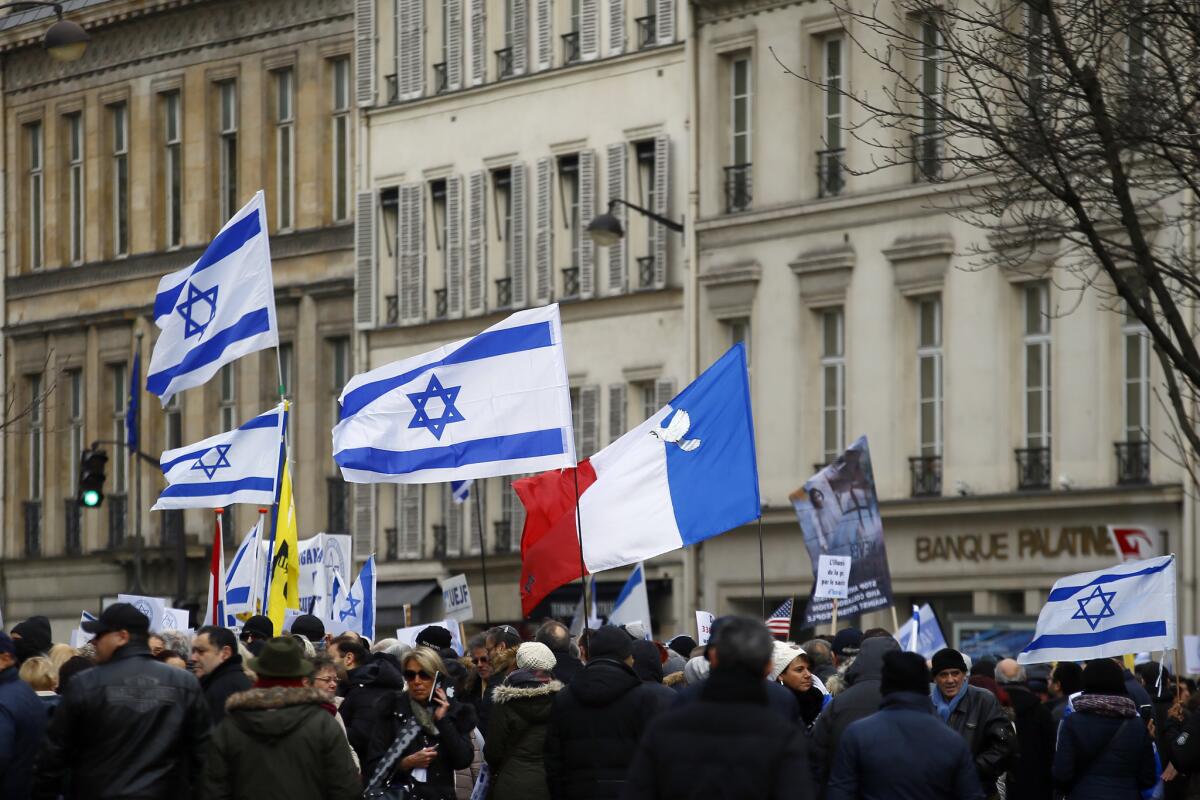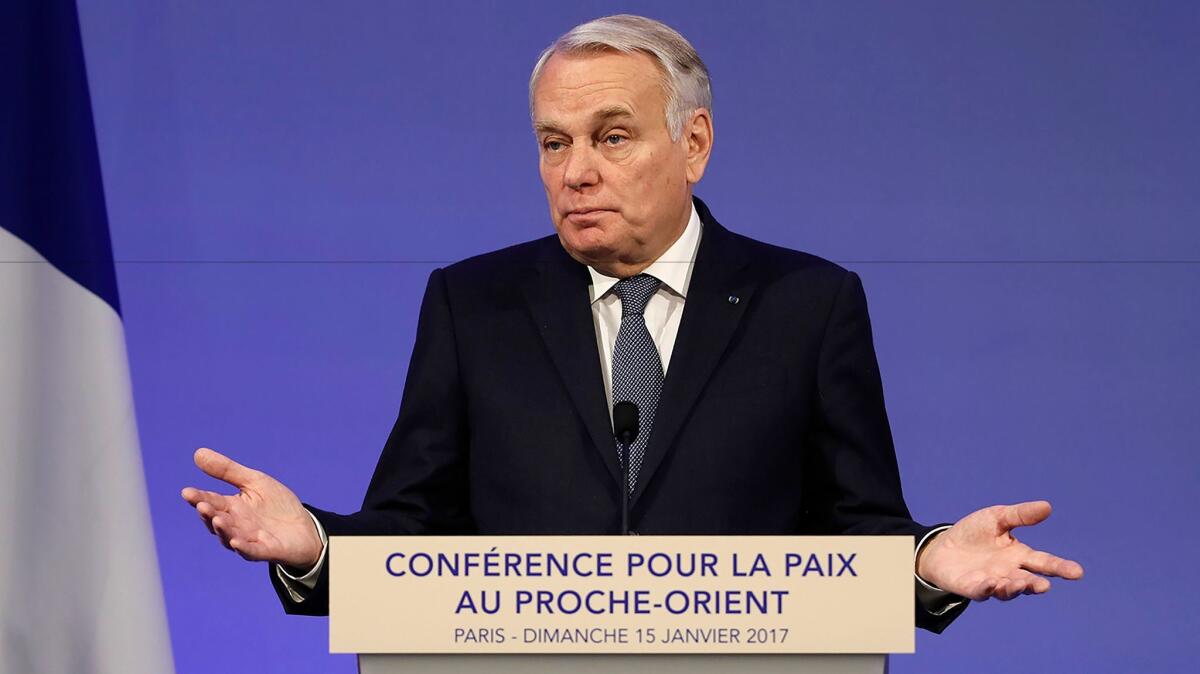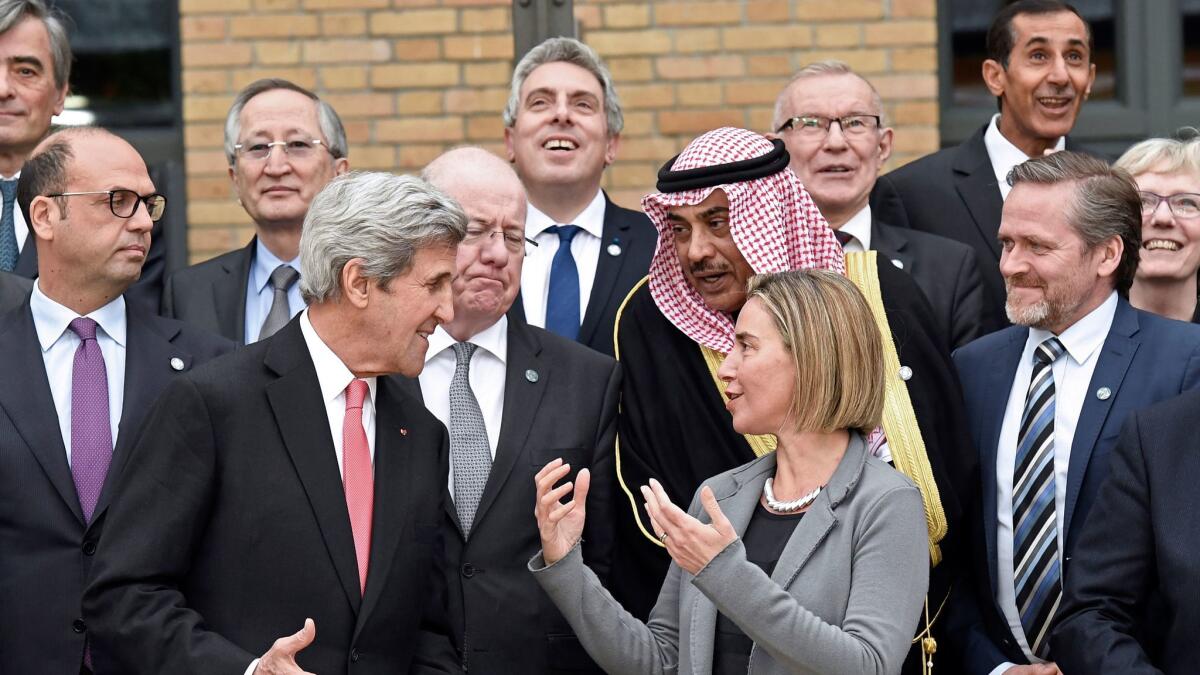Paris peace conference agrees on two-state solution in Mideast — but neither Israel nor Palestinians take part

Reporting from Paris — A conference aimed at kick-starting peace talks between Israel and the Palestinians concluded Sunday with more than 70 countries and international organizations pledging their support for a two-state solution as the only way to achieve lasting peace in the region.
However, neither Israel nor the Palestinians were represented at the conference in Paris, raising questions about its ultimate value. Palestinian leader Mahmoud Abbas had welcomed the event, but Israeli Prime Minister Benjamin Netanyahu branded it futile.
For the record:
12:26 p.m. Aug. 18, 2019This article states that a declaration called on Israel “to withdraw to its 1967 borders, as required by United Nations resolutions.” However, the declaration did not explicitly mention the borders, although it called for adherence to U.N. Resolution 242, which states that peace in the Middle East should be based, in part, on Israel’s withdrawal “from territories occupied” in the 1967 war.
The final statement at the conference called on Israel to withdraw to its 1967 borders, as required by United Nations resolutions, and for both parties to “abstain from unilateral actions” that could jeopardize future negotiations.
The lines referred to date to before the Six Day War, when Israel captured the Gaza Strip from Egypt and the West Bank and East Jerusalem from Jordan, expanding its borders beyond those drawn up in the 1949 armistice between Israel and its Arab neighbors, lines that Israel rejects.

Summing up the talks, French foreign minister Jean-Marc Ayrault said those present spoke with a “single voice to express the urgency of preserving two states, which is the only solution possible and which is threatened today.”
“If we don’t do anything, we risk letting the situation descend into a conflict; a conflict written in advance,” Ayrault said.
Hopes for a two-state solution, which envisions the countries of Israel and Palestine living side-by-side in peace, have faded as neither side has engaged in serious negotiations since 2014 and Israel has pushed ahead with settlement expansion into territory claimed by the Palestinians. Diplomats warn, however, that in a single state over the entire region in question, Israeli Jews would eventually be outnumbered by Palestinians, creating a violent, apartheid-style system.
The two-state solution is threatened and there is a need to preserve it. … Now is not the moment to stop.
— French President Francois Hollande
Ayrault said the conference was extending a hand to the Israelis and Palestinians and that those at the conference had met “for constructive reasons and in good faith to find a solution to a peace process that is at a dead end.”
U.S. Secretary of State John F. Kerry attended the meeting in what will almost certainly be his last diplomatic effort abroad. He had long hoped he could revive the stalled peace talks and coax the two sides closer to solving their intractable problems. But he was never able to engage either side, and in fact saw relations between Washington and its longtime ally, the Israeli government, deteriorate. A low point came last month when the U.S. declined to veto a United Nations resolution condemning Israel’s settlement expansion.

U.S. Secretary of State John F. Kerry speaks with European Union Foreign Policy Chief Federica Mogherini, center right, as they take part with other foreign ministers and representatives in a family picture during a Mideast peace conference in Paris on Jan. 15, 2017.
Kerry said Sunday the Paris conference “moved the ball forward,” adding he had spoken to Netanyahu to reassure him that Israel would be treated fairly.
“It underscores this is not just one administration’s point of view, this is shared by the international community broadly,” he said. Ahead of the meeting, Kerry’s aides had acknowledged to reporters that expectations for any real progress were low.
French President François Hollande also addressed the gathering, which included 36 foreign ministers, as well as Ahmed Aboul-Gheit, the secretary-general of the Arab League, and the European Union’s foreign affairs representative, Federica Mogherini. German foreign minister, Frank-Walter Steinmeier, as well as the Irish, Italian, Dutch, Polish, Portuguese, Turkish and Swedish foreign ministers were also present.
“Our common aim, which is a noble aim, is that of a fair and lasting peace between the two countries. I am conscious of the reservations and doubts about this conference … but it is urgent to act,” Hollande said.
“The two-state solution is threatened and there is a need to preserve it. … Now is not the moment to stop. The solution of two states is the only way forward and the only solution that will answer both sides’ aspirations and legitimate rights.”
As the conference opened, an angry Netanyahu dismissed it as “a last gasp” from the past and said it was unhelpful to the peace process. Israel is furious after the United Nations passed a resolution last month criticizing Israel’s expansion of settlements in the occupied West Bank and East Jerusalem. The settlements, where around 600,000 Israelis live, are considered illegal under international law, which Israel disputes.
“The conference taking place in Paris today is an idle conference. It was coordinated between the French and the Palestinians. Its purpose is to enforce on Israel conditions that are not in line with our national needs. Of course it creates a bigger gap regarding peace because it hardens the Palestinians’ stance as well as putting us further away from direct negotiations without any preconditions,” Netanyahu said.
Netanyahu also appeared to be hailing the imminent arrival of Donald Trump’s administration, which takes office on Friday. “I must say this conference is one of the last gasps for breath from yesterday’s world. Tomorrow will look different and tomorrow is very near,” the prime minister said.
Trump’s choice as the next U.S. ambassador to Israel is David Friedman, who has said he opposes the two-state solution and has supported settlement expansion.
There was no mention at the Paris conference of Trump’s stated intention to move the U.S. Embassy from Tel Aviv to Jerusalem, a city both sides want as their capital. Kerry said its inclusion would not be appropriate, because the issue is still under debate in the U.S.
Earlier, Ayrault had called on Trump to “contribute to creating conditions for peace in the Middle East,” adding that any embassy move would be a provocation that would have “extremely heavy consequences.”
Willsher is a special correspondent. Times staff writer Tracy Wilkinson in Washington contributed to this report.
ALSO
France’s Mideast peace conference is branded a failure before the doors even open
What we know about Christopher Steele, the British ex-spy who wrote the controversial Trump dossier
More to Read
Sign up for Essential California
The most important California stories and recommendations in your inbox every morning.
You may occasionally receive promotional content from the Los Angeles Times.










